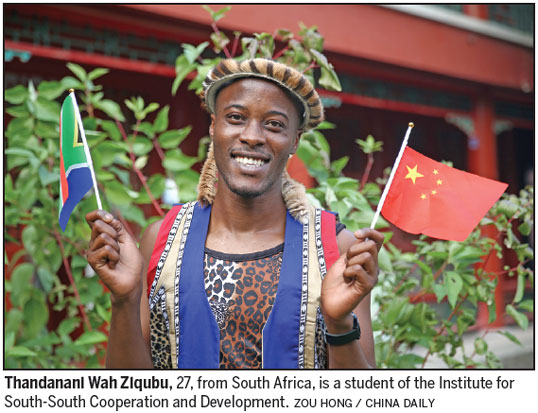Buoyant trade good news for South Africa
Trade between South Africa and China has experienced phenomenal growth over the past decade, according to South African economic experts.
Cyril Prinsloo, a researcher at the South African Institute of International Affairs, describes bilateral trade between the two countries as "phenomenal".
"This was especially important for South Africa in the period shortly after the global financial crisis, when some of the country's traditional trading partners experienced slow growth, while demand for goods from China was strong," Prinsloo says.
But it's increasingly evident that the nature of trade between the two partners is inequitable, he says. South Africa exports largely raw commodities to China, while it imports manufactured goods.

"In order to drive domestic industrialization and create more domestic jobs, the South African government is looking to address this challenge," he says.
Prinsloo believes this can be done partly by increasing direct investment, which in turn would spur the creation of more jobs and stronger value-chain linkages between the two partners.
During the ninth BRICS Summit, which experts agree was a powerful conduit for strengthening South-South cooperation, South African President Jacob Zuma spoke of an ambitious target of 5 percent growth by 2019 for South Africa.
"Our country is ready to advance an economic partnership with China in the pursuit of inclusive growth and job creation," he said.
During the Forum on China-Africa Cooperation two years ago in Johannesburg, the South African and Chinese governments signed 26 agreements worth 94 billion rand ($7.2 billion; 6 billion euros; £5.3 billion), adding fresh impetus to bilateral cooperation between the two countries.
Six priority areas were identified: alignment of industries to accelerate South Africa's industrialization process; enhancement of cooperation in special economic zones; enhancement of marine cooperation; infrastructure development; human resources cooperation; and financial cooperation.
Both sides agreed to further strengthen the joint working group, with emphasis on locomotive procurement, civilian nuclear energy projects, investment in renewable energy, investment cooperation in industrial parks, trade promotion specifically focused on South African product expos and Chinese trade missions, promoting the exporting of South African products to China and cooperation in the Black Industrialists Programme, visa facilitation, financial cooperation and the upgrading of the national electricity transmission and distribution system.
South Africa has also committed to the Belt and Road Initiative.
According to the Centre for Chinese Studies at Stellenbosch University, Chinese investors have now developed a keen interest in South African real estate, which will further increase investment in the country.
Sifiso Ntombela, head of trade and investment intelligence at South Africa's Agriculture Business Chamber, says the country's agricultural exports to China have increased to a value of $428 million.
"This is equivalent to a 4.5 percent share of total agricultural exports to the world. Growing agricultural exports have, to a certain extent, assisted the sector in becoming a temporary savior for the South African economy, as was witnessed in the second quarter of 2017, when agricultural GDP grew by 33.6 percent, thus helping the economy to move out of technical recession."
In the past two years, Chinese direct investment in South Africa has expanded. Examples include the home appliance factory of Hisense Group, the cement production line financed by Hebei Jidong Development Group and the assembly plant of China First Automotive Works in Coega Industrial Park.
Hisense recently celebrated a significant milestone of producing its millionth television and millionth refrigerator at its factory in Cape Town.
The factory now employs more than 500 people on a full-time basis, with training and social improvement projects benefiting approximately 2,000 people in the community.
Hisense is exporting to 13 African countries from its Cape Town facility.
According to a report by the South Africa-China Economic and Trade Association, Chinese enterprises in South Africa are making positive contributions to the socioeconomic wellbeing of the country.
The NGO's report says there are more than 300 Chinese companies in South Africa, of which about 140 are medium-sized or large. These are involved in fields such as real estate, mining, automobiles, finance, construction, textile, logistics and household appliances.
By the end of last year, Chinese investment in South Africa reached about $13 billion. Chinese enterprises employed more than 26,000 people, of whom 24,000 were locals, the report says.
Unemployment in South Africa is at its highest level in almost 15 years, with nearly a half a million added to the list of the jobless, offsetting nearly 150,000 jobs added to the economy.
Jessie Duarte, deputy secretary-general of the African National Congress, in an opinion piece for a South African newspaper, said the government's relationship with its main trading partner China continues to create jobs in the local market.
She commended China for its training and teaching of South Africans.
In 2015, China trained more than 400 artisans, technicians and managers in South Africa.
At the end of last year, 10 students from South African universities were chosen to take part in Huawei's Seeds for the Future Program.
The author is an online editor of the South African newspaper Weekend Argus and is currently visiting China Daily as part of a fellowship program of the China-Africa Press Centre.
For China Daily


















